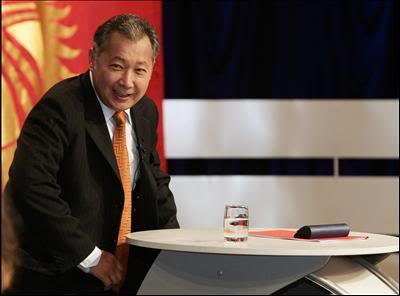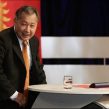
Bakiyev Reshapes the Kyrgyz Government to Suit his Interests
Publication: Eurasia Daily Monitor Volume: 6 Issue: 194
By:

The resignation of the Kyrgyz Prime Minister Igor Chudinov on October 19 and, consequently the entire government should not be confused with any attempt to reform the country’s political system. President Kurmanbek Bakiyev has indeed promised to change the way Kyrgyzstan’s government functions in order to eliminate corruption and promote more efficient decision-making. Nonetheless, recent changes indicate his wish to maximize his power over the government. The collective resignation was masterminded beforehand, with members of parliament ordered to support the new Prime Minister Daniyar Usenov, who had previously served as the chief of the presidential staff.
Bakiyev wants to reduce the number of ministries and government committees. He explains this as a necessity aimed at increasing governmental efficiency and purging incompetent officials (www.24.kg, October 21). But judging from Usenov’s appointment, this will represent a mere cadre reshuffle. The maneuver will further centralize the president’s control, who has shown that he is the only one able to sack and appoint government officials.
Usenov promised to consider opposition leaders to fill government positions (www.akipress.kg, October 21). Although the new prime minister is trying to show his willingness to collaborate with the opposition, this will only mean that both the opposition and the regime have found a basis for cooperation despite their political differences. The reshuffle allows both the president and his allies to benefit politically and financially from redistributing government posts, while the opposition leaders continue functioning as political and business actors. In short, whoever is allowed to enter the government from the opposition camp will likely have business interests coinciding with his or her political ambition. The situation may allow the most ardent opponents of Bakiyev and even contenders in the presidential election on July 23 to obtain important government posts.
Indeed, for Kyrgyz opposition leaders it is important to be part of the larger political process, especially since most are pressured by the government. Since Bakiyev came to power an unexpected number of politicians and journalists have either been killed or threatened with being violently removed. To survive in such conditions one must be either willing to compromise on personal political views and join the regime or escape Kyrgyzstan altogether. Indeed, the number of Kyrgyz political dissidents has grown in recent years.
Interestingly, however, the views of local politicians are remarkably fluid. Some former political dissidents are willing to return home and try their luck once again with the new government. Yesterday’s anti-government activists abroad are now eager to become the key promoters of Bakiyev’s regime. “To me this all is just very confusing,” one Kyrgyz dissident told Jamestown regarding his former friends who now want to return to Kyrgyz politics. For all the supporters of the Bakiyev regime residing in Kyrgyzstan or abroad, it became convenient to argue that he is actually pursuing genuine political reform and not exercising political authoritarianism. “Maybe we underestimated the influence of the Russian and Kazakhstani political systems on Kyrgyzstan. As long as the government controls the media and is able to support political rent-seekers –authoritarianism encounters little objection,” one Kyrgyz scholar explained to Jamestown.
In the political environment that Bakiyev has created in Kyrgyzstan, it is very easy for the president to dissolve the parliament and government whenever he chooses (www.parus.kg, October 21). Bakiyev’s more direct control of the security and military structures promoted by his “reforms” will further allow the president to stamp out any political dissent. Meanwhile, like its display of immediate support towards Usenov, the parliament will back any directive from the president. Former Prime Minister Chudinov is likely to earn another high-level post within the government or private sector.
Usenov is among the most well known and successful entrepreneurs and politicians in Kyrgyzstan. He occupied various posts since the early 1990’s. His political impunity allegedly helped him to promote his business interests. During the early 2000’s he was pressured by the former president Askar Akayev’s regime, but his political and entrepreneurial activity has gathered momentum under Bakiyev since 2005. He has also occupied the posts of deputy prime minister and Mayor of Bishkek (www.centrasia.ru, October 21). According to Kyrgyz observers, Usenov might have been the mastermind behind Bakiyev’s bargaining with the United States on the status of the U.S. Manas airbase earlier this year. Thanks to its geopolitical maneuvering from February to July this year, the Kyrgyz government was able to increase U.S. rent for the base and obtain 25 percent of Russia’s $2 billion credit.




